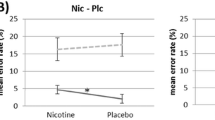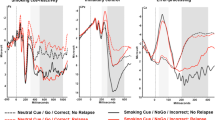Abstract
In a test of thewithdrawal-deficit hypothesis of the cognitive effects of cigarette smoking, non-deprived smokers participated in two sessions held on consecutive days. In both sessions, subjects performed two 20-min continuous performance tasks (CPTs). The CPT was a relatively “easy” version designed to require minimal practice (digit 0 target response; digits 1–9 nontarget response; 19% of stimuli targets). In one session, subjects smoked a cigarette prior to each CPT; in the other session they did not smoke (session order counterbalanced). Reaction time (RT) was significantly faster in the smoking session than in the non-smoking session with no difference in number of incorrect responses, a finding incompatible with the withdrawal-deficit hypothesis. Further, light inhalers (as assessed by pre-smoking to post-task increase in expired air carbon monoxide) appeared to process nontarget stimuli faster than deep inhalers, especially in the no smoking session. The results also indicated that, at least during the first CPT of each session, the performance of females in the no smoking session was poorer than in the smoking session and poorer than males regardless of session. In the latter part of the first CPT, the performance of males in the smoking session was better than their performance in the no smoking session. No clear pattern emerged for the second CPT.
Similar content being viewed by others
References
Benowitz NL (1986) The human pharmacology of nicotine. In: Cappell HD et al (eds) Research advances in alcohol and drug problems, vol 9. Plenum Press, New York, pp 1–52. Tollison RD (ed) Smoking and society: toward a more balanced assessment. Heath, Lexington MA, pp 89–134
Edwards JA, Wesnes K, Warburton DM, Gale A (1985) Evidence of more rapid stimulus evaluation following cigarette smoking. Addict Behav 10:113–126
Frearson W, Barrett P, Eysenck HJ (1988) Intelligence, reaction time, and the effects of smoking. Person Individ Diff 9:497–517
Gilbert DG, Robinson JH, Chamberlin CL, Spielberger CD (1989) Effects of smoking/nicotine on anxiety, heart rate, and lateralization of EEG during a stressful movie. Psychophysiology 26:311–320
Golding J, Mangan GL (1982) Arousing and dearousing effects of cigarette smoking under conditions of stress and mild sensory isolation. Psychophysiology 19:449–456
Hasenfratz M, Michel C, Nil R, Bättig K (1989a) Can smoking increase attention in rapid information processing during noise? Electrocortical, physiological, and behavioral effects. Psychopharmacology 98:75–80
Hasenfratz M, Pfiffner D, Pellaud K, Bättig K (1989b) Postlunch smoking for pleasure seeking or arousal maintenance? Pharmacol Biochem Behav 34:631–639
Heishman SJ, Snyder FR, Henningfield JE (1990) Effects of repeated nicotine administration. In: Harris L (ed) Problems of drug dependence 1990: Proceedings of the 52nd annual meeting of the committee on problems of drug dependence (NIDA Research Monograph 105). National Institute of Drug Abuse, Rockville, MD, pp 314–315
Herning RI, Brigham J, Stitzer ML, Glover BJ, Pickworth WB, Henningfield JE (1990) The effects of nicotine on information processing: medicating a deficit. Psychophysiology 27:S2
Hindmarch I, Kerr JS, Sherwood N (1990) Effects of nicotine gum on psychomotor performance in smokers and non-smokers. Psychopharmacology 100:535–541
Kerr JS, Sherwood N, Hindmarch I (1991) Separate and combined effects of the social drugs on psychomotor performance. Psychopharmacology 104:113–119
Landers DM, Lindholm E, Crews DJ, Koriath JJ (1990) Cigarette smoking and smokeless tobacco facilitate information processing and performance. Psychophysiology 27:S47
Leigh G, Tong JE, Campbell JA (1977) Effects of ethanol and tobacco on divided attention. J Stud Alcohol 38:1233–1239
Michel Ch, Bättig K (1988) Separate and joint effects of cigarette smoking and alcohol consumption on mental performance and physiological functions. Act Nerv Super 30:107–109
Michel Ch, Bättig K (1989) Separate and combined psychophysiological effects of cigarette smoking and alcohol consumption. Psychopharmacology 97:65–73
Michel Ch, Hasenfratz M, Nil R, Bättig K (1988) Cardiovascular, electrocortical, and behavioral effects of nicotine chewing gum. Klin Wochenschr 66 [Suppl XI]:72–79
Nil R, Woodson PP, Michel C, Bättig K (1988) Effects of smoking on mental performance and vegetative functions in high and low CO absorbing smokers. Klin Wochenschr 66 [Suppl XI]:66–71
Parrott AC, Winder G (1989) Nicotine chewing gum (2 mg, 4 mg) and cigarette smoking: comparative effects upon vigilance and heart rate. Psychopharmacology 99:257–261
Petrie RXA, Deary IJ (1989) Smoking and human information processing. Psychopharmacology 99:393–396
Pritchard WS (1990) Cigarette smoking and the human EEG. Psychophysiology 27:S1
Pritchard WS (1991a) Electroencephalographic effects of cigarette smoking. Psychopharmacology 104:485–490
Pritchard WS (1991b) The link between smoking and P: a serotonergic hypothesis. Person Individ Diff 12:1187–1204
Pritchard WS, Robinson JH, de Bethizy JD, Davis RA (1991) Effects of smoking and caffeine on EEG, heart rate, performance, and anxiety/mental alertness/muscular tension. Psychophysiology 28:S44
Provost SC, Woodward R (1991) Effects of nicotine gum on repeated administration of the Stroop test. Psychopharmacology 104:536–540
Revell AD (1988) Smoking and performance — a puff-by-puff analysis. Psychopharmacology 96:563–565
Robinson JH, Pritchard WS, Davis RA (1992) Psychopharmacological effects of smoking a cigarette with typical “tar” and carbon monoxide yields but minimal nicotine. Psychopharmacology 108:466–472
Sherwood N, Kerr JS, Hindmarch I (1990) No differences in the psychomotor response of heavy, light and non-smokers to the acute administration of nicotine. Med Sci Res 18:839–840
Sherwood N, Kerr JS, Hindmarch I (1991) Effects of nicotine on short-term memory. In: Adlkofer F, Thurau K (eds) Effects of nicotine on biological systems. Birkhäuser, Basel, pp 531–535
Snyder FR, Davis FC, Henningfield JE (1989) The tobacco withdrawal syndrome: performance decrements assessed on a computerized test battery. Drug Alcohol Depend 23:259–266
Spielberger CD (1986) Psychological determinants of smoking behavior. In: Tollison RD (ed) Smoking and society: toward a more balanced assessment. Heath, Lexington MA, pp 89–134
Warburton DM (1988) The functional use of nicotine. In: Wald NJ, Froggatt P (eds) Nicotine, smoking and the low tar programme. Oxford, London, pp 182–199
Warburton DM, Revell A, Walters AC (1988) Nicotine as a resource. In: Rand M, Turau K (eds) The pharmacology of nicotine. IRL, London, pp 359–373
Wesnes K, Revell A (1984) The separate and combined effects of scopolamine and nicotine on human information processing. Psychopharmacology 84:5–11
Wesnes K, Warburton DM (1978) The effects of cigarette smoking and nicotine tablets upon human attention. In: Thornton RE (ed) Smoking behaviour. Physiological and psychological influences. Churchill Livingstone, New York, pp 131–147
Wesnes K, Warburton DM (1983) Effects of smoking on rapid information processing performance. Neuropsychobiology 9:223–229
Wesnes K, Warburton DM (1984a) Smoking, nicotine, and human performance. In: Balfour DJK (ed) Nicotine and the tobacco smoking habit. Pergamon Press, Oxford, pp 133–152
Wesnes K, Warburton, DM (1984b) The effects of cigarettes of varying yield on rapid information processing performance. Psychopharmacology 82:338–342
Wesnes K, Warburton DM (1984c) Effects of scopolamine and nicotine on human rapid information processing performance. Psychopharmacology 82:147–150
Wesnes K, Warburton DM, Matz, B (1983) Effects of nicotine on stimulus sensitivity and response bias in a visual vigilance task. Neuropsychobiology 9:41–44
West RJ (1990) Nicotine pharmacodynamics: Some unresolved issues. In Bock G, Marsh J (eds) The biology of nicotine dependence. Wiley, Chichester, pp 210–224
West RJ, Hack S (1991) Effects of cigarettes on memory search and subjective ratings. Pharmacol Biochem Behav 38:281–286
West RJ, Jarvis MJ (1986) Effects of nicotine on finger tapping rate in non-smokers. Pharmacol Biochem Behav 25:727–731
Williams DG (1980) Effects of cigarette smoking on immediate memory and performance in different kinds of smoker. Br J Psychol 71:83–90
Williams DG, Tata PR, Miskella J (1984) Different “types” of cigarette smokers received similar effects from smoking. Addict Behav 9:207–210
Author information
Authors and Affiliations
Rights and permissions
About this article
Cite this article
Pritchard, W.S., Robinson, J.H. & Guy, T.D. Enhancement of continuous performance task reaction time by smoking in non-deprived smokers. Psychopharmacology 108, 437–442 (1992). https://doi.org/10.1007/BF02247417
Received:
Revised:
Issue Date:
DOI: https://doi.org/10.1007/BF02247417




